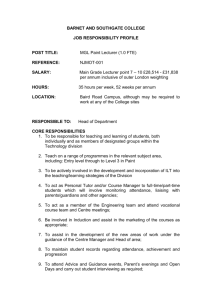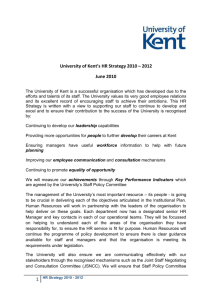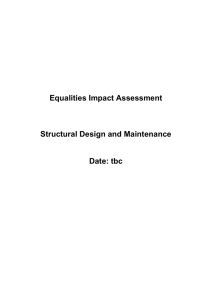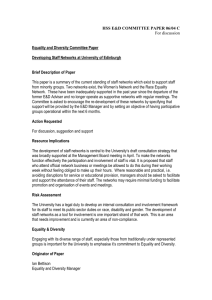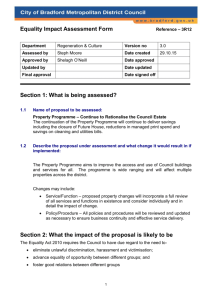University`s Policy Framework
advertisement
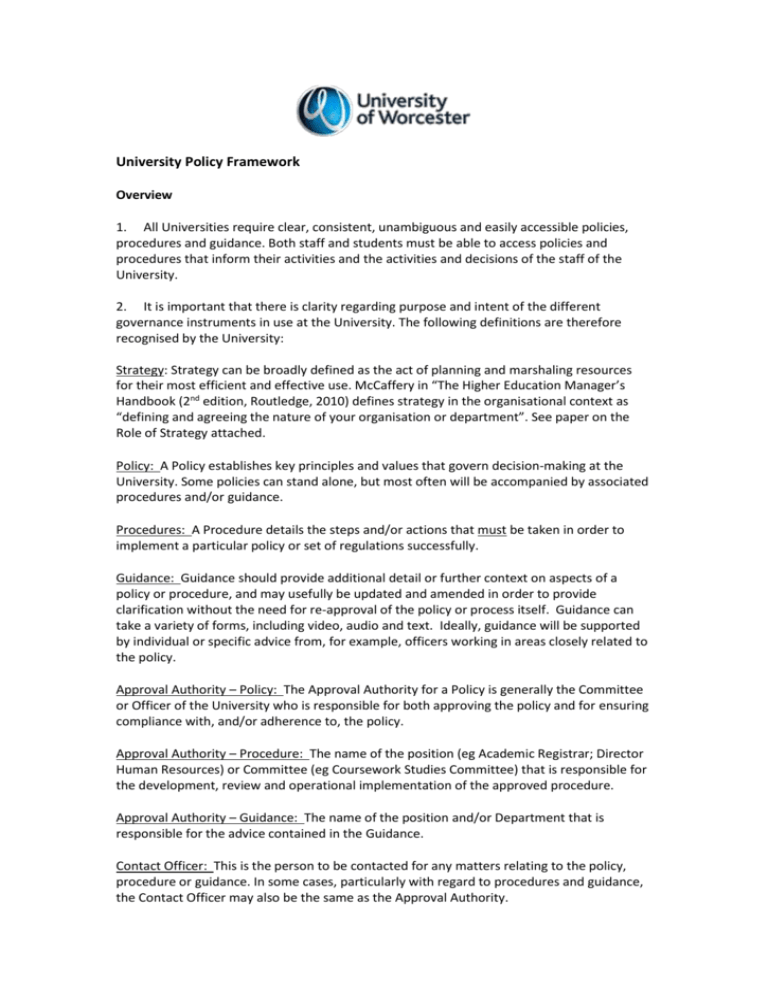
University Policy Framework Overview 1. All Universities require clear, consistent, unambiguous and easily accessible policies, procedures and guidance. Both staff and students must be able to access policies and procedures that inform their activities and the activities and decisions of the staff of the University. 2. It is important that there is clarity regarding purpose and intent of the different governance instruments in use at the University. The following definitions are therefore recognised by the University: Strategy: Strategy can be broadly defined as the act of planning and marshaling resources for their most efficient and effective use. McCaffery in “The Higher Education Manager’s Handbook (2nd edition, Routledge, 2010) defines strategy in the organisational context as “defining and agreeing the nature of your organisation or department”. See paper on the Role of Strategy attached. Policy: A Policy establishes key principles and values that govern decision-making at the University. Some policies can stand alone, but most often will be accompanied by associated procedures and/or guidance. Procedures: A Procedure details the steps and/or actions that must be taken in order to implement a particular policy or set of regulations successfully. Guidance: Guidance should provide additional detail or further context on aspects of a policy or procedure, and may usefully be updated and amended in order to provide clarification without the need for re-approval of the policy or process itself. Guidance can take a variety of forms, including video, audio and text. Ideally, guidance will be supported by individual or specific advice from, for example, officers working in areas closely related to the policy. Approval Authority – Policy: The Approval Authority for a Policy is generally the Committee or Officer of the University who is responsible for both approving the policy and for ensuring compliance with, and/or adherence to, the policy. Approval Authority – Procedure: The name of the position (eg Academic Registrar; Director Human Resources) or Committee (eg Coursework Studies Committee) that is responsible for the development, review and operational implementation of the approved procedure. Approval Authority – Guidance: The name of the position and/or Department that is responsible for the advice contained in the Guidance. Contact Officer: This is the person to be contacted for any matters relating to the policy, procedure or guidance. In some cases, particularly with regard to procedures and guidance, the Contact Officer may also be the same as the Approval Authority. Scope 3. This Framework will be used by all University staff involved in any aspect of institutional policy, procedure or guidance development and subsequent review, approval or implementation. The Framework NOTE: Hereafter, where the word policy is used in this document it is to be read to include University policies, procedures and guidance. Overarching Principles 4. All University policy will be developed in accordance with the University’s approved Policy Framework (this document). 5. Adherence to policy is mandatory for all staff and students; when and if situations arise that call into question the validity of a policy, changes should not be made unilaterally but sought through the relevant Approval Authority. 6. Appropriate policy development should involve: establishing need research and analysis (scoping) drafting (including discussion papers for all new policies) consultation (and possible redrafting) approval communication implementation equality impact assessment review and evaluation Consistency and Uniformity 7. There is an approved: Policy Template Procedure Template Guidance Template (for textual guidance) These templates are attached as appendices to this paper. 8. All policies, procedures and guidance must be submitted for to the Approval Authority in the relevant template. 9. All policies are to be reviewed and signed off by the relevant Approval Authority for formal approval. 10. Approval Authorities will be determined and agreed by the policy maker, seeking advice through line-management as appropriate. Publication and Availability 11. Draft documents will not be made available externally, except with the approval of the relevant Approval Authority. 12. Students will have access to drafts in accordance with their representation on University Committees and the confidential nature of the document. Similarly, the Students’ Union will have access to drafts in accordance with their role and with due respect to confidentiality. 13. It is useful and advisable for all University level policies to be published on an established and internally accessible area of the University website. Such policies should be published with the name of a contact officer. Approved documents should be clearly labeled if they are not to be accessed automatically by an external audience, but it should be noted that in all but the most exceptional circumstances would be available in response to an FOI request. 14. In order for a centralised page linking such policies to be effective, certain protocols will need to be followed. In many cases these are already acknowledged and departments are well used to managing version control. However, such names should remain unchanged (eg. ‘AssessmentPolicy.doc’) regardless of the date of publication/revision in order for links to remain valid. Consultation, Development, Review and Evaluation 15. Consultation should be wide, inclusive and provide sufficient time for the provision of feedback. There is no set form or process for such consultation aside for ensuring that such means are fit for purpose and avoid undue burden. However, consultation should always be held with appropriate groups. 16. The default review period will be three years from the date of the last review or date of commencement for new policies. An earlier review date may be set, as appropriate. Review dates can and should be brought forward where a clear need is recognised. 17. A fundamental aspect of review will be the evaluation of the policy as it has been implemented over the previous period. Again, there is no set form or process for such evaluation aside for ensuring that consideration of its success (normally evidenced through practice) and, potentially, impact, is recognised and recorded. It is credible and desirable at this point to consider the need for continued approval of the policy. Evaluation processes should not create undue burden for officers, committees or the subjects of the policies under review. 18. Amendments, updates and revisions to existing University policies are subject to the same approval and publishing process as for new policies. This means that there is no immediate requirement to amend existing policies, but that any relevant amendments should be made at the point of review; and after evaluation. 19. A policy will remain in force unless formally revoked by the relevant Approval Authority or superseded by another policy. 20. Where structural changes to the University result in a different Approval Authority for a particular policy, the existing policy will remain in force until the next review. POLICY Policy Title Contact Officer Provide the position title rather than the name of a person Purpose A clear and succinct statement of the reason for the policy written in the active voice. Overview An overview of the policy, including any background information that provides context to the policy determination. This section should include definitions where that is necessary for purposes of clarity. Scope The staff and or students to whom the policy applies. The Policy This is the core section of the policy document. It should outline the underlying principles that constitute the policy. These policy statements should be as short and concise as is possible. They should be definite (eg appointment will be on the basis of merit; materials purchased from Library funds will be part of the Library collection and available for general use). The Policy defines the ‘What’. The procedure is to outline the Who, How and When and should be contained within a separate document – although clearly linked to the Policy. Guidance provides additional detail or further context on aspects of a policy or procedure. They are informative rather than mandatory and could take a variety of forms. Equality Impact Assessment (Equality Analysis) completed Day/Month/Year and who completed it (role title) Date Policy Approved Day/Month/Year Approval Authority eg. Academic Board Date of Commencement Day Month Year Amendment Dates List the dates the policy has been amended (Day/Month/Year) Date for Next Review Day/Month/Year Related Policies, Procedures, Guidance, Forms or Templates Name and link to related policies, procedures or guidance, etc. – the aim is to ensure that staff or students can easily access related information Policies/Rules Superseded by this Policy List the policy, policies and / or previous authority superseded by this new policy PROCEDURE Procedure for [Associated Policy Title or of Regulatory Framework] Contact Officer Provide the position title rather than the name of a person Purpose A clear and succinct statement of the reason for the procedure including the name of the policy (or policies) the procedure supports. The procedure is to outline the Who, How and When – questions of why (for what purpose) should be contained within the policy document. Procedure The steps and/or actions that must be undertaken to implement a particular policy. Not all policies will require a procedure document, whilst others will require more than one. Responsible party or parties to carry out steps/action Step 1 Responsible party or parties to carry out steps/action Step 2 Responsible party or parties to carry out steps/action Step 3…etc (add sections below as appropriate) Equality Impact Assessment (Equality Analysis) completed Day/Month/Year and who completed it (role title) Date Approved Day/Month/Year Approval Authority eg. Registrar/LTSEC Date of Commencement Day/Month/Year Amendment Dates List the dates the policy has been amended (Day/Month/Year) Date for Next Review Day/Month/Year Related Policies, Name and link to related policies, procedures or guidance to Procedures and Guidance ensure ease of access to related information GUIDANCE Guidance for [Associated Policy Title] and/or [Associated Procedure] Contact Officer Provide the position title rather than the name of a person Purpose A statement about the purpose of the guidance. Guidance Related Policies / Procedures Name and link to related policies and/or procedures. Links Links to relevant documentation, forms, explanatory notes. Date Approved Day/Month/Year Approval Authority eg. Head of Student Services
